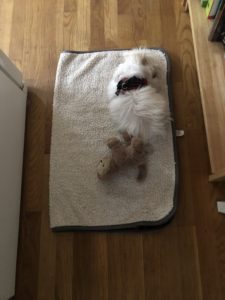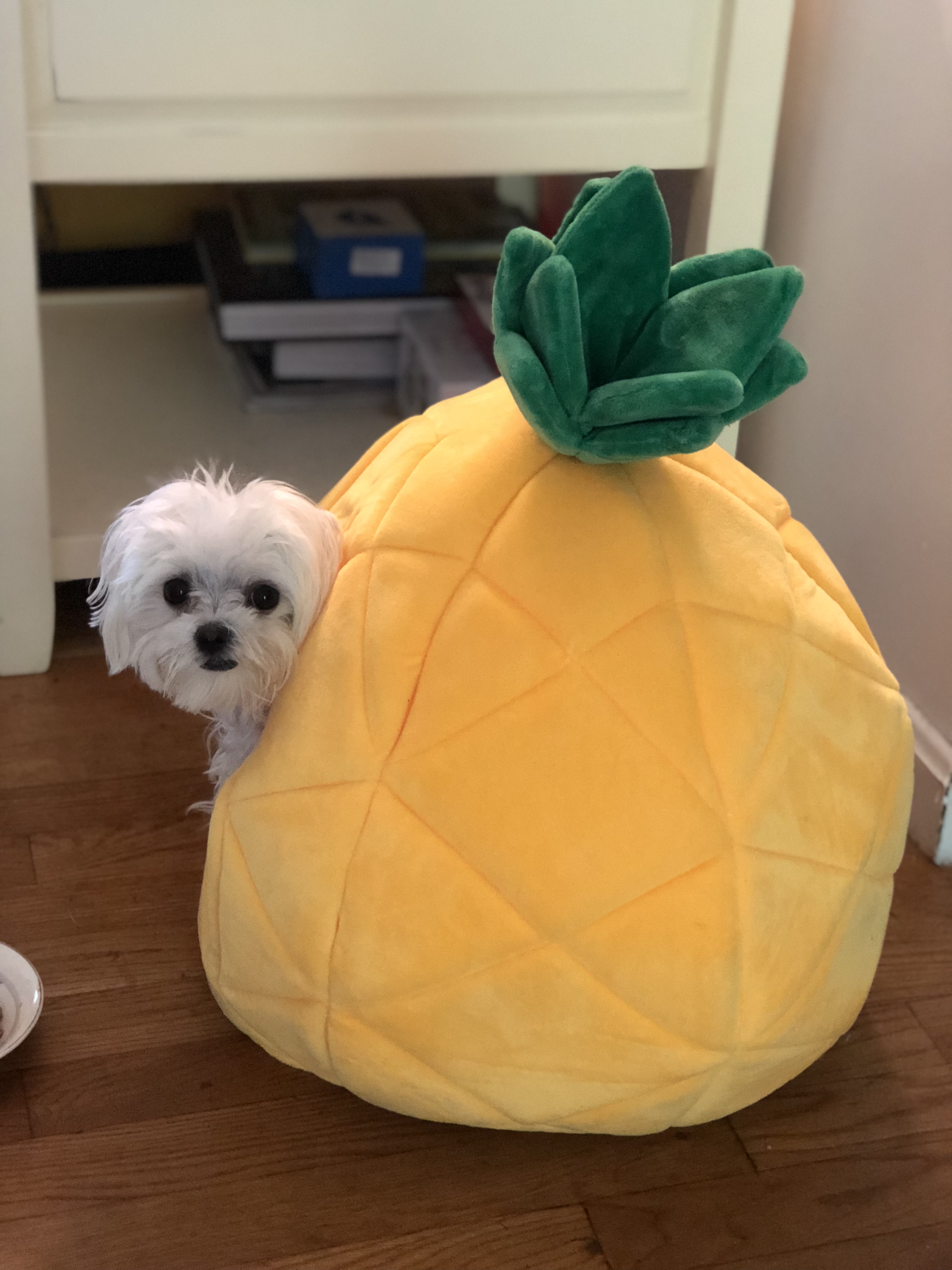Halitosis (Bad Breath)
 Halitosis (Bad Breath)
Halitosis (Bad Breath)
Big word ! it may mean serious complications.
Halitosis may be caused by strong food odor, or plaque build up on the teeth.
Let us explore all possible causes.
Teething ( for Puppies ) :
if your lovely puppy is less than 9 moths and experience bad breath, while he is getting rid of his milk teeth (all 28 of them), to make room for the adult version of his teeth (42 in total), during this process, there will be occasional bleeding and excessive Saliva.
That blend of Saliva and blood can cause the bad odor.
Solution :
Luckily this will tend to fix itself when the puppy gets her new teeth, proud owner can always help by daily brushing the puppy’s teeth.
Kibbles:
We are going to get into the Wet vs dry food discussion, dry food is the better for teeth and digestive system, but that comes with a price of bad breath odor. Basically , Kibbles are coated with tiny flecks that tend to break off during handling and those partials tend to stick to teeth when the doc eat them and they mix with Saliva.
The easy solution to this is you store the Kibbles in air tight containers, you basically want to maintain the freshness of the kibbles as much as you can. Also make sure you have enough fresh bowl of water next to food plate, the doc need to be reminded of the water so he can continue to drink.
Nothing beats a good old teeth brushing, make this a daily care routine
No Dental care:
This is the most common reason for a Maltese having chronic bad breath, often severe enough to make your nose wrinkle. Around the clock, plaque is being produced in a dog’s mouth. It is a clear, extremely sticky substance that clings to the teeth. It starts to harden into tartar (also referred to as calculus) rather quickly, in as little as just 3 days. Plaque and tartar release acids that eat away at the enamel on the teeth, this often leads to tooth decay. It can also move under the gum line and cause gum infections (gingivitis).
The plaque itself can have a very bad odor even before it does any damage to a dog’s teeth. It’s a rather putrid smell, that some equate to rotting food, decomposing fish, or a nondescript garbage-like smell.
In addition to that, bacteria linked to infection (decay in a Maltese’s tooth or gum infection) can cause a very offensive smell that is often referred to as a bitter odor.
What to do:
It’s a long-held myth that dogs can keep their teeth clean simply by chewing on toys. While this helps to some small degree, it wildly insufficient to keep teeth clean and bad breath at bay.
First, you will want to have your Maltese examined by the veterinarian to check for infection or decay and have those issues resolved. This may include extraction, application of sealant, and a ‘full dental’ cleaning. Note that if a tooth is rotting, no amount of at-home care and fix it; this warrants professional care.
Then, once serious issues have been ruled out and/or resolved, it will be time to stay on a strict at-home dental care plan to
Foreign Object in the Mouth
Though not common, this should be ruled out, particularly if you are already taking good care of your Maltese’s teeth and have ruled out teething and kibble particle powder.
What happens:
Whenever there is a foreign object in the mouth, the body responds by producing excess saliva, which on its own can cause a mild case of bad breath. In addition, if the culprit has pierced the skin and there is bleeding, this may also contribute to the odor.
The top offender is a splinter of some sort, often a sliver of wood from mouthing things outside. Another possibility is a piece of grass wedged between the teeth. Typically, there will be other signs including reluctance to eat due to discomfort.
What to do:
Using a flashlight and easier done with a helper, you may be able to see the object. Depending on what it is and where it is located, you may be able to dislodge it with your Maltese’s toothbrush or by gripping it with a paper towel. In the case of a splinter in the mouth, it’s best to have the veterinarian remove the culprit.
Underlying Health Conditions
Though much far less common than the preceding reasons for a Maltese having a case of bad breath, there are some diseases that have halitosis as one of the signs. This includes:
Diabetes. Canine diabetes is linked to bad breath in a number of ways. If blood sugar levels are exceedingly high, this can produce a strong fruity smell. In addition, dogs with diabetes are at greater risk for gum disease and associated infections. Aside from possible bad breath, other signs include changes in appetite, excessive thirst, excessive urination, changes in weight, lethargy, reoccurring urinary tract infections, upset stomach, vomiting, chronic skin issues, and/or vision problems.
Kidney issues. In the case of kidney stones, kidney infection, or other related conditions that affect the functioning of a dog’s kidneys, breath may develop a strong ammonia-type smell. Other signs may include trouble urinating, blood in the urine, fever, and/or signs of discomfort (odd stance, hunched over appearance).
Lung issues. Any illness that involves the lungs can involve bad breath. Conditions include canine flu, kennel cough, and bacterial or viral lung infections. Other signs are rather obvious and include coughing, and/or wheezing.
Digestive issues. An upset stomach may involve burps (silent or audible) that hold strong odors, and regular breathing that holds a sour, acid-type smell. Other signs may include reluctance to eat, lethargy, runny stools, and/or nausea. The cause of digestive issues varies quite a bit, from inferior food with high grain, by-product, or chemical composition, to food intolerance, bacterial infection, and parasitic infection.
How to Keep a Maltese’s Breath Nice and Fresh
Fortunately, if serious issues have been ruled out, ensuring that your Maltese has fresh breath is rather straightforward. Soon, you’ll be able to cuddle up with your little guy or gal and not have to turn your head away.
There are 3 steps:
Brush your Maltese’s teeth using the right products.
As the importance of at-home dental care is becoming clearer to owners, products are flooding the market. It’s crucial to use the right ones.
The toothbrush. With toy dogs like the Maltese, sizing is vital, as is quality. You’ll want the brush to be as noninvasive as possible while working well to scrub away plaque. Opt for a brush that is sized for small dogs or consider using a finger toothbrush which is a small piece that slips over your pointer finger; many dogs find this more tolerable.
The paste. Human toothpaste is toxic to dogs and is a choking hazard due to the foaming action. For these important reasons, you will want to use a paste designed for dogs, it will be ingestible (since dogs cannot spit and are meant to swallow it) and it will be non-foaming. To help your Maltese enjoy this task, look for one with an appealing flavor.
Recommendations: A great little set that’s perfect for Maltese is the Petrodex Dental Kit for Puppies and Small Dogs. This contains a properly sized 360-degree spin brush that makes it easy to reach all areas of the teeth, a finger toothbrush if your Maltese prefers that, and a very effective canine toothpaste that is chicken and mint flavored.
Aim to brush the teeth at least once per day, preferably after dinner. If your Maltese is not used to this, start slow with short 30 second sessions, working your way up to at least 3 minutes.
Offer a daily dental chew.
Though these are marketed as being the only step needed, that’s a bit of an overstatement; however, these do play a big role in keeping a dog’s teeth healthy and breath nice and clean.
It’s important to note that these sorts of dental treats are designed to be very hard; they must be, in order to scrape off plaque. Being a hard treat, these are not meant for an owner to give to their dog and then walk away; you’ll want to be there to supervise and be sure to obtain dental chews that are properly sized for your Maltese.
Recommendations: By far, Greenies is the most popular and effective dental chew, and of their many offerings, we highly recommend Greenie Teenie Grain-Free Dental Dog Chews. These come in a range of sizes to ensure that your dog has the right one, with the teenie size designed for dogs 5 to 15 lbs.
These are very effective yet easily digestible, are approved by the Veterinary Oral Health Council, and are made in the USA.
Dental Water Supplement.
There’s only so many opportunities to work at keeping your Maltese’s teeth clean and breath smelling nice; so, a water supplement can be very beneficial for good overall dental hygiene as it is there all throughout the day to help in this regard.
With this, a very small amount is added to a dog’s water; it is typically tasteless and very well tolerated.
Recommendations: There are lots to choose from; however, Nylabone Advanced Oral Care Dog Tartar Remover is a superior choice. This contains Denta-C which breaks up tartar buildup and helps kill bacteria both in the bowl and in the mouth. If you use the right amount, it will not change the taste of the water at all. And, while the Denta-C does make the water light blue, most dogs do not notice or mind.
A bottle lasts a very long time; just 1 tablespoon is needed for every 4 cups of water. If you are giving your Maltese bottled spring water (one recommended method, since unfiltered tap water is filled with harmful chemicals), you would add 4 tablespoons to the full gallon and shake to mix it up.
A Final Word
Halitosis is something that should never be ignored since the reason behind a Maltese having bad breath is almost always an issue that needs to be addressed. As you work to resolve the halitosis, you’ll be improving your Maltese’s care in numerous ways, with fresh breath one of the beneficial outcomes.
If your Maltese does not respond to these at-home remedies for bad breath, it will be time for a full checkup with the veterinarian to determine the underlying cause and rule out possible health conditions.
